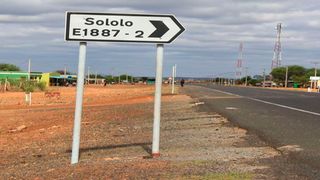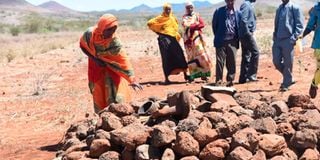
A sign post showing Sololo in Marsabit.
| Joseph Kanyi | Nation Media GroupMarsabit
Premium
Fighting fuels growing arms trade as militias in Marsabit stockpile
On March 11, police officers in Sololo, on the Moyale-Marsabit road, intercepted a 24-year-old woman attempting to smuggle explosives into Kenya.
The woman’s bag had three grenades and four teargas canisters, according to police.
Police were conducting a search in a 14-seater matatu at a checkpoint, about 30 kilometres from the Kenya-Ethiopia border, when they found the explosives.
It has not been established where she was headed.
The find came barely a month after a Marsabit county government vehicle was seized carrying bullets by Border Police Unit (BPU) officers in Elle-Borr.
With such incidents, fingers would be pointed at Al-Shabaab and other terrorist groups.
Arming local militias
However, intelligence reports acquired by the Nation show the weapons are being given to militias engaged in fighting between the Gabra and Borana in Marsabit County.
“We are not dealing with a terrorist organisation in this area. These are local militias arming. It is a concern for security agencies,” county BPU head John Mathiu said.
For decades, clashes between members of the two communities have left hundreds dead and thousands injured and displaced.
As peace negotiations yield little or no results, the animosity continues.
Control of resources and greed for power have been the drivers of the violence between these communities.
With the General Election fast approaching, government authorities fear politicians are fanning violence.
Local political and community leaders are linked to the formation and arming of militias.

One of the deserted villages between Sololo and Turbi in Marsabit County on March 17, 2021. Locals fled due to insecurity.
Displace rival groups
The aim is to displace rival groups in order to swell voter numbers in their favour.
Authorities say this is breeding a new form of home-grown terrorism that could throw the entire region into anarchy.
“Violence whose sole aim is displacement is in itself terrorism,” Sololo Deputy County Commissioner Dennis Kyeti said.
Funan Qumbi and Funan Idha townships on the Turbi-Sololo wards border are deserted due to clashes that have lasted a month.
At play are militias that have been killing, maiming and displacing people and stealing livestock.
Though residents of the two centres have fled for fear of retaliatory attacks, spies and scouts remain, hidden in the bushy and rocky Turbi hills.
Their job is to be lookouts for attackers and who among the warring communities will fire the first shot.
Attacking law enforcers
But there is more. The militias have turned their weapons on law enforcers. A group recently attempted to raid Turbi Police Station, the divisional headquarters.
On February 9, security officers repulsed four men who raided the station. Police said the attackers fled to Turbi hills.
While it is not clear on whose orders the men were acting, it has emerged that mercenaries from Ethiopia are taking part in the clashes.
One of the groups believed to be involved in the fighting is Ethiopia-based Oromo Liberation Front (OLF).
OLF members have been active in Marsabit for more than two years, taking part in guerrilla-type attacks on villages.
Documents from the Ministry of Interior obtained by the Nation corroborate our findings.
OLF hideouts
According to the files, investigations have unearthed OLF operational camps and hideouts in Funan Idha.
“Government military attire, drugs, OLF uniforms, relief food, civilian clothes, household goods, equipment, an Oromia Cooperative Bank book, among other items were found in the camp believed to be predominantly occupied by the OLF members,” the document dated March 10, 2021 reads.
“OLF members have been staging attacks on the Gabra with the knowledge, blessings and funding from politicians of one community.”
This is not the first time the OLF has been fingered as a participant in the Marsabit bloodbath.
In fact, the group is said to have been behind the killing of 11 Gabra elders during a peace meeting in Forole on the Kenya-Ethiopia border two years ago.

Vehicles carrying bodies of 11 members of a security team and elders who were killed in Folore, Marsabit County in 2019.
The elders and security committee members set out for two peace meetings supposedly initiated by elders from Ethiopia on May 5, 2019. It turned out to be a deadly trick.
Rogue police reservists
When foreigners are not involved in the raids, former and current rogue police reservists fight alongside militias.
They train and arm fighters in remote parts of the vast arid county.
It is out of this realisation that the government started disarming the reservists.
The disarmament was said to have been advised by findings that government weapons were being used in the ethnic killings.
The disarmament was, however, marred with reports of irregularities. Some leaders and residents said it was selective.
Following the disarmament, residents turned to militias, pushing up the proliferation of illegal guns and smuggling from Ethiopia.
Intelligence reports suggest the Gabra and Borana could be arming their militias to displace people ahead of the 2022 elections.
The National Cohesion and Integration Commission (NCIC) said there were 100,000 illegal firearms in the hands of civilians in Marsabit County as of September last year.
Porous border
Unmanned points on the porous Kenya-Ethiopia border allow in migrant fighters and members of militia groups like the OLF.
The illegal trade in firearms is thriving.
A light weapon goes for about Sh20,000 while machine guns and more sophisticated firearms are sold for around Sh150,000.
A bullet is bought for as little as Sh200. Local leaders are believed to be bankrolling the business.
Apart from adopting military-grade arsenal, the militia groups have taken up technology.
They use social media to spread propaganda and spew hate against rival communities and militias.
Twitter, WhatsApp and Facebook have become important communication tools in a land traditionally cast as disconnected from modernity.
Incitement tool
Vernacular radio stations had emerged as a tool for incitement but tough regulations on the broadcasters saw a migration to internet-based platforms.
Local political and community leaders have been accused of masterminding the incitement and propaganda.
“One of our toughest roles has been identifying and taming these social media networks but we need to find a long-lasting solution,” Mr Kyeti said.
The most intriguing aspect of the militias is their intelligence capability, which seems to match or even surpass that of the government.
Besides using scouts and spies for surveillance and reconnaissance, the militias have adopted internet-based messaging platforms to communicate.
The sophisticated web of networks is used to convey vital information on movement, attacks and even government security operations.

Ms Galano Jillo at the grave of her husband who was killed in an attack in Garshaba village in Marsabit in 2019. Knee-jerk reactions by the government in its attempts to end the killings have failed to yield results.
Real time information
Leaders and militias get the information in real time during or after an attack, sometimes even before law enforcers.
“By the time we get a report of a killing, the victim’s tribesmen hundreds of kilometres away have the information,” Mr Kyeti said.
This, the administrator added, creates an avenue for distortion and manipulation of information, leading to retaliatory attacks.
In a land where trust is almost non-existent and secrecy is a way of life, community policing is proving to be a mismatch for the networks, which are usually organised in cells trickling down to village level.
This, coupled with the language barrier facing non-local security operatives, keeps the militias a step ahead of the government.
Knee-jerk reactions by the government in its attempts to end the killings have failed to yield results.
Bias claims
State officials have been accused by members of the two communities of bias.
The government has deployed specialised BPU and General Service Unit officers to the volatile region.
This has only been a temporary reprieve. The police officers’ camps usually act as buffers between the communities.
Security operatives are pushing for dialogue between the Gabra and Borana with the hope of finding a long-term solution to the bloodshed.





